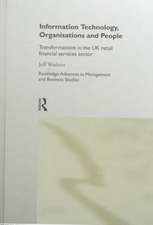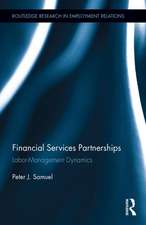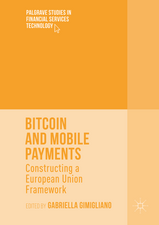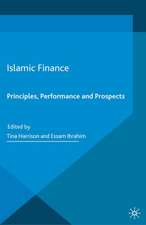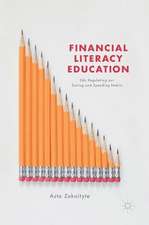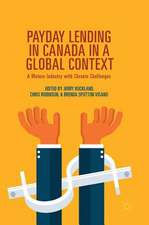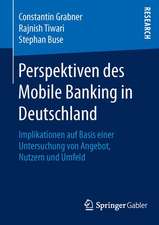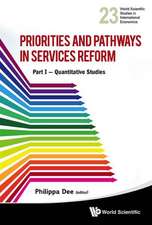Financial Literacy and the Limits of Financial Decision-Making
Editat de Tina Harrisonen Limba Engleză Paperback – 14 iun 2018
| Toate formatele și edițiile | Preț | Express |
|---|---|---|
| Paperback (1) | 944.67 lei 43-57 zile | |
| Springer International Publishing – 14 iun 2018 | 944.67 lei 43-57 zile | |
| Hardback (1) | 948.92 lei 43-57 zile | |
| Springer International Publishing – 4 oct 2016 | 948.92 lei 43-57 zile |
Preț: 944.67 lei
Preț vechi: 1152.04 lei
-18% Nou
Puncte Express: 1417
Preț estimativ în valută:
180.79€ • 188.05$ • 149.25£
180.79€ • 188.05$ • 149.25£
Carte tipărită la comandă
Livrare economică 14-28 aprilie
Preluare comenzi: 021 569.72.76
Specificații
ISBN-13: 9783319809083
ISBN-10: 3319809083
Pagini: 343
Ilustrații: XVIII, 343 p.
Dimensiuni: 140 x 216 mm
Greutate: 0.42 kg
Ediția:Softcover reprint of the original 1st ed. 2016
Editura: Springer International Publishing
Colecția Palgrave Macmillan
Locul publicării:Cham, Switzerland
ISBN-10: 3319809083
Pagini: 343
Ilustrații: XVIII, 343 p.
Dimensiuni: 140 x 216 mm
Greutate: 0.42 kg
Ediția:Softcover reprint of the original 1st ed. 2016
Editura: Springer International Publishing
Colecția Palgrave Macmillan
Locul publicării:Cham, Switzerland
Cuprins
Introduction; Tina Harrison.- Chapter 1: Cognitivedrivers of suboptimal financial decisions: Implications for financial literacycampaigns; Hooman Estelami.- Chapter 2: How mutual fund investors’ objective andsubjective knowledge impacts their information search and processing behaviour; Sanjay Kumar Mishra and Manoj Kumar.- Chapter 3: Do investors show anattentional bias toward past performance? An eye-tracking experiment on visualattention to mutual fund disclosures in simplified fund prospectuses; AndreasHüsser and Werner Wirth.- Chapter 4: Overconfidence and emotion regulationfailure: How overconfidence leads to the disposition effect in consumerinvestment behaviour; Wujin Chu, Meeja Im and Hyunkyu Jang.-Chapter 5: Consumer rationality/irrationality and financial literacy in thecredit card market: Implications from an integrative review; Na Shen.- Chapter 6: Financial literacy and shrouded credit cardrewards; Laura Ricaldi, Michael S Finke and Sandra J Huston.- Chapter 7: Aremen better investors than women? Gender differences in mutual fund and pensioninvestments; Rita Martenson.- Chapter 8: Genderstereotyping in financial advisors’ assessment of customers; Inga-Lill Söderberg.- Chapter 9: Tailored financial literacy education:An indigenous perspective; Mark Brimble and Levon Blue.- Chapter10: Financial literacy and financial literacy programmes in Australia; Andrew C Worthington.- Chapter 11: Assessment of behavioural outcomes offinancial education workshops on financial behaviour of the participants: Anexperimental study; Harsha Vijaykumar Jariwala and MahendraS Sharma.
Notă biografică
Dr TinaHarrison isthe Personal Chair of Financial Services Marketing and Consumption at theUniversity of Edinburgh Business School, UK. She is also the Editor ofPalgrave's Journal of Financial Services Marketing.
Textul de pe ultima copertă
This book presents selected paperson the factors that serve to influence an individual’s capacity in financialdecision-making. Initial chapters provide an overview of the cognitive factorsaffecting financial decisions and suggest a link between limited cognitivecapacity and the need for financial education. The book then expands on thesecognitive limitations to explore the tendency for overconfidence indecision-making and the interplay between rational and irrational factors.Later contributions show how credit card companies benefit from limitations inconsumer financial literacy, how gender and cognition intersect to play animportant role in financial decision-making, and how to improve financialcapacity through financial literacy and education campaigns, including thoseaddressing developed marketplaces. This comprehensive collection of papers willbe of value to all readers who seek to better understand the multi-factorialand complex nature of personal financial management in today’s economicclimate.
Caracteristici
Explores financial literacy and other factors that influence capacity in financial decision-making Provides an overview of the cognitive factors affecting financial Demonstrates how credit card companies benefit from consumer limitations Explores the role gender plays in financial decision-making Suggests how to improve financial capacity through financial literacyand education campaigns Includes examples from both a developed and a developing market




